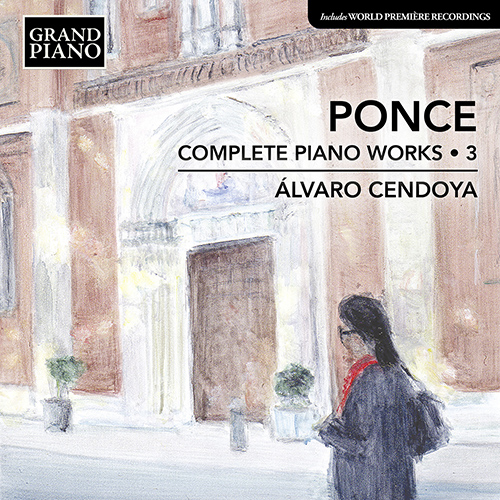
About this Release
“A prolific composer, Manuel Ponce is known today mostly for his guitar music. However, he was a brilliant pianist in his own right and left behind a wealth of works for the piano of over 200 pieces that remain largely unknown and range from salonesque dances to the most learned of fugues. In these works he combined his affinity for Musical Romanticism with French impressionism, Neoclassic models, and Mexican folk songs, while still projecting his own compositional voice. I wanted to show three contrasting parts on this album, the first one dedicated to the instrumental virtuosity of the composer´s youthful years and his studies in Berlin with Martin Krause, a pupil of F. Liszt. The second part features twenty easy pieces on Mexican themes, with their creativity focused on children’s music, ranging from indigenous themes to popular airs that emerged during the time of the Mexican revolution such as “La Cucaracha”, “La Valentina” and “La Adelita”. Finally, in the third part is one of my favourite Ponce pieces: Mazurka n°23. It is also an honour for me to include in this album the piece Vespertina in its world premiere recording.” — Álvaro Cendoya
PONCE, MANUEL MARÍA (1882–1948)
Complete Piano Works • 3
- Álvaro Cendoya, piano
Not only was Manuel Ponce the leading figure in the emergence of Mexican nationalism but his music embodies a wide variety of influences. Nowhere is this more evident than in his writing for solo piano, and this album, the third of eight volumes, explores three specific facets. The first is his youthful concert studies, which are virtuosic, atmospheric and memorably evocative. The second, the Veinte piezas fáciles (‘Twenty Easy Pieces’), consist of ingenious pianistic adaptations of Mexican folk songs and dances, some indigenous. The third element is his personalised use of Romanticism in the form of mazurkas, character pieces and the dazzling Bersagliera. Álvaro Cendoya continues his acclaimed cycle dedicated to the complete piano music of Manuel Ponce.
Tracklist
|
1
Étude de Moscheles (Moscheles Etude) (1906) (00:02:45)
|
|
2
12 Estudios de concierto (12 Concert Studies): No. 1. Preludio trágico (Tragic Prelude) (1913) (00:05:27)
|
|
3
12 Estudios de concierto (12 Concert Studies): No. 3. Hacia la cima (Towards the Summit) (1903) (00:04:59)
|
|
4
12 Estudios de concierto (12 Concert Studies): No. 6. Alma en primavera (The Soul in Spring) (1899) (00:02:18)
|
|
5
12 Estudios de concierto (12 Concert Studies): No. 7. Juventud (Youth) (1913) (00:03:38)
|
|
6
12 Estudios de concierto (12 Concert Studies): No. 8. Preludio galante (Gallant Prelude) (1913) (00:02:56)
|
|
7
12 Estudios de concierto (12 Concert Studies): No. 10. Jarabe (1913) (00:06:04)
|
|
8
12 Estudios de concierto (12 Concert Studies): No. 12. La vida sonríe (Life Smiles) (1913) (00:05:36)
|
|
20 Piezas fáciles (20 Easy Pieces) (1939) (00:00:00 )
|
|
9
No. 1. Canción de los tamales (Tamales Song) (00:00:29)
|
|
10
No. 2. Danza yaqui (Yaqui Dance) (00:00:30)
|
|
11
No. 3. Los xtoles (The Xtoles) (00:00:25)
|
|
12
No. 4. Danza de la lluvia (Rain Dance) (00:00:36)
|
|
13
No. 5. Canción de la lluvia (Rain Song) (00:00:45)
|
|
14
No. 6. Danza de los tecuanes (Tecuanes Dance) (00:00:18)
|
|
15
No. 7. Canción campesina (Peasant Song) (00:01:45)
|
|
16
No. 8. Cielito lindo (00:00:59)
|
|
17
No. 9. Las mañanitas (00:01:28)
|
|
18
No. 10. Yo no sé que decir (I Don't Know What to Say) (00:00:47)
|
|
19
No. 11. La pasadita (00:00:29)
|
|
20
No. 12. La sandunga (00:01:06)
|
|
21
No. 13. Ven, ¡Oh, Luna! (Come, Oh Moon!) (00:01:22)
|
|
22
No. 14. Homenaje a Villanueva (Homage to Villanueva) (00:00:44)
|
|
23
No. 15. Arrullo popular (Popular Lullaby) (00:00:45)
|
|
24
No. 16. La posada (00:00:35)
|
|
25
No. 17. La revolución (The Revolution) (00:01:25)
|
|
26
No. 18. La cucaracha (The Cockroach) (00:00:54)
|
|
27
No. 19. Primavera (Spring) (00:01:19)
|
|
28
No. 20. La patria (Homeland) (00:00:57)
|
|
29
Vespertina for Piano (1909) * (00:04:46)
|
|
30
Mayo (May) (1903) (00:02:56)
|
|
31
Mazurka No. 19 in C-Sharp Minor (1917) (00:02:50)
|
|
32
Mazurka No. 23 (20) in A Minor (1917) (00:04:39)
|
|
33
Bersagliera (1903) (00:02:43)
|
The Artist(s)
 Álvaro Cendoya started his piano studies in his native Spain, followed by three years of studies in Buenos Aires, and later in London. In 1989 he won the prize for the best interpretation of Spanish music at the international Premio Jaén competition. He made international début in Geneva in 1995 and at Wigmore Hall a year later. Cendoya went on to give recitals and master classes around the world, including the UK, several European countries, the USA, across South America, in Iran, Beirut, Shanghai and Beijing. Previous recordings include music by Cuban composer Ignacio Cervantes and the Basque composer Garbizu. He is a professor at the Basque Conservatory of Music.
Álvaro Cendoya started his piano studies in his native Spain, followed by three years of studies in Buenos Aires, and later in London. In 1989 he won the prize for the best interpretation of Spanish music at the international Premio Jaén competition. He made international début in Geneva in 1995 and at Wigmore Hall a year later. Cendoya went on to give recitals and master classes around the world, including the UK, several European countries, the USA, across South America, in Iran, Beirut, Shanghai and Beijing. Previous recordings include music by Cuban composer Ignacio Cervantes and the Basque composer Garbizu. He is a professor at the Basque Conservatory of Music. The Composer(s)
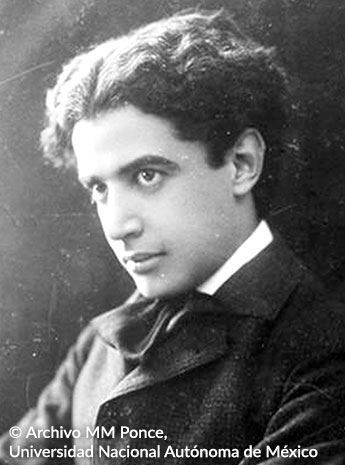 Manuel María Ponce was the author of a substantial and significant body of work and, as one of Mexico’s most prolific and well-known composers, is still held in great esteem today. His catalogue takes in virtually all genres and forms of music. One fundamental characteristic of his work is the use he made throughout his career of different styles, reflecting his range of knowledge and mastery of different compositional techniques. Broadly speaking, his music ranges from the post-Romanticism of the previous generation of composers to a modernism which made sporadic appearances in his early works but really began to establish itself in the music he wrote during his time in Paris (1925–33) and thereafter.
Manuel María Ponce was the author of a substantial and significant body of work and, as one of Mexico’s most prolific and well-known composers, is still held in great esteem today. His catalogue takes in virtually all genres and forms of music. One fundamental characteristic of his work is the use he made throughout his career of different styles, reflecting his range of knowledge and mastery of different compositional techniques. Broadly speaking, his music ranges from the post-Romanticism of the previous generation of composers to a modernism which made sporadic appearances in his early works but really began to establish itself in the music he wrote during his time in Paris (1925–33) and thereafter. Reviews

“…what Álvaro Cendoya does seem to me irreproachable. Bravo!” – Melómano (Spain)
“Cendoya’s playing throughout is musically charming, technically accomplished…I can promise that there is a good amount of music that may be new to many listeners, and all captured in excellent sound. Here’s looking forward to Cendoya’s next Ponce album!” – Fanfare
“Cendoya is in full command of every etude… Most of the music here is rewarding and has me looking forward to Volume 4, which should arrive any year now.” – American Record Guide
“Álvaro Cendoya well captures and projects each one’s character, be it joyful or sad. If you enjoy piano music, consider making room in your collection for the unjustly overlooked piano music of Manuel Ponce.” – Classical Music Sentinel

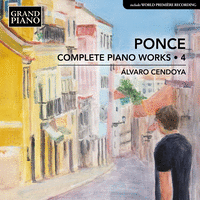
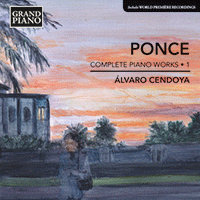
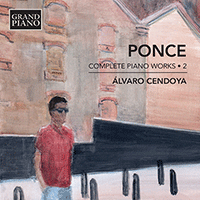
 Grand Piano has gained a reputation for producing high quality recordings of rare keyboard gems. Dedicated to the exploration of undiscovered piano repertoire, the label specialises in complete cycles of piano works by many lesser-known composers, whose output might otherwise have remained unknown and unrecorded.
Grand Piano has gained a reputation for producing high quality recordings of rare keyboard gems. Dedicated to the exploration of undiscovered piano repertoire, the label specialises in complete cycles of piano works by many lesser-known composers, whose output might otherwise have remained unknown and unrecorded.






